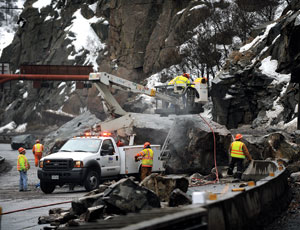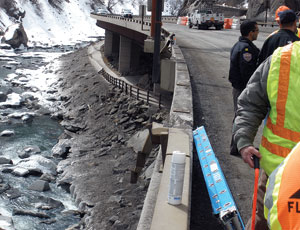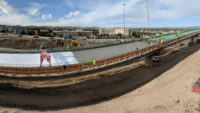A rocky season in Colorado began on cue on March 8 with a rockslide on Interstate 70 near Glenwood Springs. It punched holes in a bridge and dumped boulders the size of semitrucks on the highway, closing a 17-mile stretch. Four days later, the Colorado Dept. of Transportation announced that Flatiron Construction Corp. of Longmont, Colo., was the apparent low bidder for the contract to repair damage. The job includes 400 linear ft of westbound barrier, 150 linear ft of eastbound steel bridge rail, a design-build fix of 460 sq ft of retaining wall, 500 tons of base course and 400 tons of patching asphalt.


CDOT crews spent most of the following four days blasting 20 boulders ranging in size from 3 ft to 10 ft in diameter, with the largest estimated to weigh 66 tons. Before the highway reopened, CDOT geologists also scaled the hillside to assess the stability of the existing rock. They removed loose rocks with pry bars and blasted larger rocks that were determined to be unstable.
CDOT reopened one lane in each direction on March 12. Glenwood Canyon serves about 20,000 vehicles a day, with 15% being trucks, says Stacey Stegman, CDOT spokeswoman. The week the highway was closed, traffic was forced onto a 200-mile detour.
While cleanup was taking place, CDOT implemented its emergency contracting procedures, which included opening the repair work to bids. It met with five potential contractors, one as early as the morning the slide occurred.
On March 12, CDOT announced that Flatiron estimated the cost of repairs at $860,417. The firm will begin repairs on March 22 and will complete the project in 55 days, according to Terry Ostrom, Flatiron’s district manager.
“Our plan for the first week is to leave traffic in its current configuration as we move our team in and begin clearing rocks from under the bridge along the bike path and opening the holes on the bridge,” says Scott Stetson, Flatiron’s general superintendent. “Our goal is to have the closed eastbound lane repaired and opened by March 26.”
Flatiron’s win is particularly striking considering Flatiron was the contractor on the original construction of I-70 through Glenwood Canyon, which took place between 1980 and 1992. “We still have all the equipment we need for the twin bridges. We have a local presence with superintendents, workers who live near the canyon and a casting facility 27 miles down the highway in Rifle, Colorado,” says Ostrom, who worked as the project manager on the original construction in the late 1980s. “We have done many of these types of repairs in the canyon before,” he adds. “We have a reputation for completing emergency-type work like this quickly.”
The Glenwood Canyon slide is being compared by CDOT to one that occurred on Thanksgiving Day 2004 that required $1.2 million in total repairs. That total included the cost of temporary repairs as well as drilling, blasting and rock removal by state crews.
The transportation department’s current rockslide mitigation budget for 2010 is $2.4 million. Gov. Bill Ritter (D) issued a disaster declaration in March, which allows the state to seek funding from the Federal Highway Administration to help pay for repairs.
“We did apply for federal emergency funding, but do not know yet when that will be granted,” says Stegman, CDOT’s spokeswoman. “These funds come on a reimbursement basis, so it could be quite some time before we know if we’ll receive that funding.”



Post a comment to this article
Report Abusive Comment